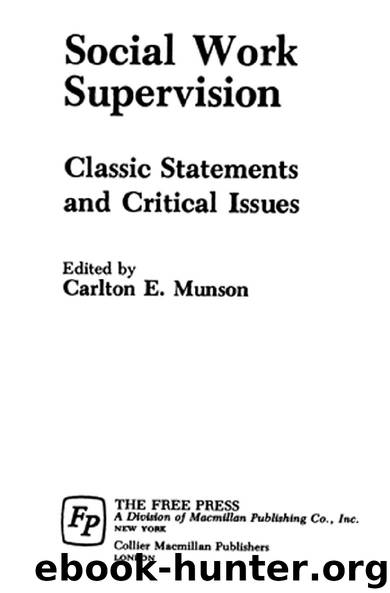Social Work Supervision by Carlton E. Munson

Author:Carlton E. Munson
Language: eng
Format: epub
Publisher: The Free Press
Published: 1979-07-15T00:00:00+00:00
SUPERVISORS’ GAMES
It would be doing both supervisor and supervisee an injustice to omit any reference to games initiated by Supervisors—unjust to the supervisees in that such omission would imply that they alone play games in supervision and unjust to the supervisors in suggesting that they lack the imagination and capacity to devise their own counter-games. Supervisors play games out of felt threats to their position in the hierarchy, uncertainty about their authority, reluctance to use their authority, a desire to be liked, a need for the supervisees’ approbation—and out of some hostility to supervisees that is inevitable in such a complex, intimate relationship.
One of the classic supervisory games is called “I Wonder Why You Really Said That?” This is the game of redefining honest disagreement so that it appears to be psychological resistance. Honest disagreement requires that the supervisor defend his point of view, present the research evidence in support of his contention, be sufficiently acquainted with the literature so he can cite the knowledge that argues for the correctness of what he is saying. If honest disagreement is redefined as resistance, the burden is shifted to the supervisee. He has to examine his needs and motives that prompt him to question what the supervisor has said. The supervisor is thus relieved of the burden of validating what he has said and the onus for defense now rests with the supervisee.
Another classic supervisory game is “One Good Question Deserves Another.” It was explicated some years ago by a new supervisor writing of her experience in an article called “Through Supervision With Gun and Camera”:
I learned that another part of a supervisor’s skills, as far as the workers are concerned, is to know all the answers. I was able to get out of this very easily. I discovered that when a worker asks a question, the best thing to do is to immediately ask for what she thinks. While the worker is figuring out the answer to her own question (this is known as growth and development), the supervisor quickly tries to figure it out also. She may arrive at the answer the same time as the worker, but the worker somehow assumes that she knew it all along. This is very comfortable for the supervisor. In the event that neither the worker nor the supervisor succeeds in coming up with a useful thought on the question the worker has raised, the supervisor can look wise and suggest that they think about it and discuss it further next time. This gives the supervisor plenty of time to look up the subject and leaves the worker with the feeling that the supervisor is giving great weight to her question. In the event that the supervisor does not want to go to all the trouble, she can just tell the worker that she does not know the answer (this is known as helping the worker accept the limitations of the super- vision) and tell her to look it up herself…. 6
Download
This site does not store any files on its server. We only index and link to content provided by other sites. Please contact the content providers to delete copyright contents if any and email us, we'll remove relevant links or contents immediately.
Bullshit Jobs by David Graeber(4177)
Radical Candor by Kim Scott(2710)
I Am Right, You Are Wrong by Edward De Bono(2438)
23:27 by H. L. Roberts(2245)
Nomadland by Jessica Bruder(2058)
Average Is Over by Tyler Cowen(1844)
The Conflict Resolution Phrase Book by Barbara Mitchell & Cornelia Gamlem(1772)
Out of Our Minds: Learning to Be Creative by Ken Robinson(1740)
High-Impact Interview Questions by Victoria A. Hoevemeyer(1690)
The Ideal Team Player by Patrick M. Lencioni(1640)
An Everyone Culture: Becoming a Deliberately Developmental Organization by Robert Kegan & Lisa Laskow Lahey(1631)
Who Moved My Cheese?: An Amazing Way to Deal With Change in Your Work and in Your Life by Johnson Spencer(1628)
The Asshole Survival Guide by Robert I. Sutton(1598)
Automatic Society by Bernard Stiegler(1547)
Unleashed by Anne Morriss & Frances Frei(1538)
Who by Street Randy & Smart Geoff(1501)
42 Rules of Employee Engagement by Susan Stamm(1463)
96 Great Interview Questions to Ask Before You Hire by Paul Falcone(1450)
Fish! by Stephen C. Lundin(1398)
